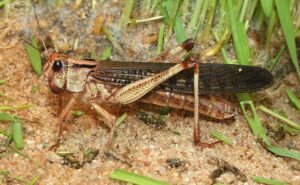
The Locusta migratoria species, with its two “jumping legs” clearly visible.
In this week’s parsha, Shemini, we are presented with the Torah’s extensive dietary laws. All bugs and insects are forbidden for consumption except those that are winged and have two large jumping legs in addition to their four other legs, ie. locusts (Leviticus 11:21-22). The Torah names four families of such locust species which are kosher. Rashi comments that we no longer know how to identify these species, so for practical purposes no one eats such insects anymore (although a small minority of Mizrachi and Sephardi communities did consume locusts until recently).
The bigger issue today is the broader prohibition of consuming bugs, and how it applies to inadvertent consumption of tiny bugs in fruits and vegetables. It has become common to hear extremely negative language regarding such accidental consumption, with people saying (untrue) things like inadvertently eating bugs on poorly-washed lettuce or strawberries is “five times worse” than consuming pork, and with reputable kashrut organizations pushing more and more stringent requirements for washing produce—using bright lamps and magnifying glasses and even doing “laboratory testing”. Is any of this actually required? What does Jewish law actually say about washing produce and consuming errant bugs? Continue reading
